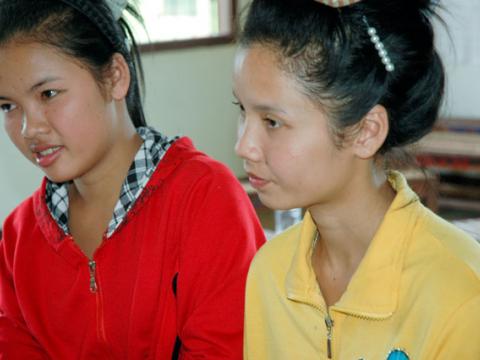Sisters help raise awareness on dangers of human trafficking

Suphalee, 16, and her elder sister have been active volunteers with World Vision for the past two years. They live in Heardokkeo village in Atsaphone district. Atsaphone is at the central part of Savannakhet province, where World Vision operates an Anti-Human Trafficking Project.
Around 107 Atsaphone villagers, including 38 women, are presently working in Thailand. Their families fear that many of the villagers who left have fallen into the world of modern-day slavery and may have ended up in exploitative working conditions.
Prior to the anti-trafficking activities conducted by World Vision in their village, Suphalee had no idea about the possibilities and dangers of trafficking.
“If someone came and encouraged me to work in another country with a good salary, I don’t think I would have turned it down,” she says. “But now that I have this knowledge, I will no longer be swayed by empty promises.”
Suphalee says she understands why many families take their chances: “Considering the amount they expect to earn if they go, no one would ever think of the dangers. For them, it is an opportunity.”
She points out that people have not been informed about the risks of trafficking, and that the lack of education of the people makes them vulnerable to the scheming fronts of brokers.
“I was afraid my sister would also become a victim, so I encouraged her to join the project,” Suphalee says. Aside from helping their community learn about the perils of human trafficking, she and her sister also learned valuable skills, such as design and communications, though taking part in the project activities.
Suphalee would like to see the anti-human trafficking project of reach other villages as well. Suphalee recognises the importance of informing the community to protect their children and themselves should they decide to work in foreign countries.
“They must at least know what documents to prepare and the contact numbers of police and other people who can help them should they get into trouble,” she adds.
But for Suphalee, working in another country is no longer an option. She knows the dangers and is sharing them with her friends, her community – and most importantly, her sister.